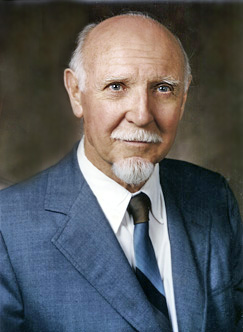 |
| Image source -https://upload.wikimedia.org/wikipedia/commons/f/fe/Raymond_Cattell.jpg |
"But psychology is a more tricky field, in which even outstanding authorities have been known to run in circles, 'describing things which everyone knows in language which no one understands."
Essential Points about Raymond Catell
(Structured-Based Systems Theory)
1) With his background in chemistry, Catell hoped that factor analysis would lead psychology to its own periodic table of the elements.
2) Specification equations - formulas that specify the ways in which traits are weighted in relation to given situations and then combined to predict behavior
3) Person's trait vary from one situation to another which he called trait loading
4) Structure-Based Systems Theory set of traits that guide behavior, but can be modified by complex interactions with the culture and situations.
5) Factor Analysis - technique designed to simplify a complex set of data by accounting for them in terms of underlying factors, usually fewer in number than the original number of variables in the original data set.
R technique - form of factor analysis used to infer underlying source traits in large subject populations.
P technique - form of factor analysis that permits assessment of the unique trait structure of an individual.
6) Structure of Personality
Surface - observable trait that is controlled by an underlying source trait.
Source - underlying characteristic inferred from the intercorrelations among a number of measured variables, or surface traits.
Traits - relatively permanent and broad reaction tendencies that serve as the building blocks of personality; traits initiate and guide behavior.
Ability traits - crystallized intelligence and fluid intelligence
constitutional - traits determined by biology.
environmental - mold - traits determined by experience.
ability - skills that enable individuals to cope effectively with problems posed by the environment.
temperament - innate tendencies to react to the environment in particular ways; includes such variables as the person’s moodiness, excitability, and activity level.
Dynamic traits - ergs (instinct, biological, primary needs) and meta-ergs (sentiment and attitude), characteristics that embrace people’s motives and interests.
Dynamic lattice - organized system of traits within human personality.
Subsidiation - process involving the interrelatedness of traits within the dynamic lattice or organizational structure of personality; attitudes are dependent on sentiments; sentiments are dependent on ergs.
7) Three kinds of data for comprehensive sampling, to capture the full range of personality dimensions:
Life data (or L-data), which involves collecting data from the individual’s natural, everyday life behaviors, measuring their characteristic behavior patterns in the real world. This could range from number of traffic accidents or number of parties attended each month, to grade point average in school or number of illnesses or divorces.
Experimental data (or T-data), objective tests, which involves reactions to standardized experimental situations created in a lab where a subject’s behavior can be objectively observed and measured.
Questionnaire data (or Q-data), self-rating questionnaire, which involves responses based on introspection by the individual about their own behavior and feelings. He found that this kind of direct questioning often measured subtle internal states and viewpoints that might be hard to see or measure in external behavior.
| Image source - http://withfriendship.com/images/g/31654/16-Personality-Factors-pic.jpg |
8) Developed Tests: 16 Personality Factor Questionnaire for adults, the Adolescent Personality Questionnaire, and the Children’s Personality Questionnaire.
Sixteen Personality Factor Test - factor-analytically derived questionnaire designed to measure the primary or basic underlying traits of personality.
Clinical Analysis Questionnaire - test designed to measure normal and deviant personality traits; includes the 16 PF traits and 12 other psychopathological traits.
9) Three kinds of learning
1) Classical conditioning - type of learning in which a stimulus that is originally incapable of evoking a response becomes capable of evoking it after continued pairing of this stimulus with one that naturally produces the response.
2) Instrumental conditioning - type of learning in which the presentation of a rewarding or punishing stimulus is made contingent on the occurrence of a response or behavior; also known as operant conditioning.
3) Structured Learning/ integration learning - type of learning in which people utilize their reasoning abilities and value systems to maximize the attainment of long-range goals.
Strengths
- introduced the most sophisticated technique of analyzing personality (factor analysis)
- emphasized group study rather than study of individuals
- developed syntality - collecting large amount of data from a single subject or group over a long period of time
Weaknesses
- people's behavior is determined by their group's affiliations
- complicated research technique
- criticised by some group for his approach of quantifying human attributes
Trivia:
Cattell adhered to a mixture of eugenics and theology, which he eventually named Beyondism and proposed as "a new morality from science". Beyondism is based on the premise that groups, like individuals, evolve based on survival of the fittest.
"genthanasia," in which the former (failing groups) would be "phased out" by the latter (successful groups) through "educational and birth control measures"—that is, by segregating them and preventing their reproduction.
Restrictive Eugenics - program to reduce the birth rate of the mentally handicapped; Cattell advocated this program in the belief that such individuals are a costly burden to society and slow its evolutionary growth.
Creative Eugenics - program designed to increase the birth rate of more intelligent people in the belief that such individuals will develop sounder ethical values and contributes more to society’s well being.
| Image source http://ecx.images-amazon.com/images/I/418KiM82PkL.jpg |
Sources, References and Related Links:
Personality, Delia Limpingco and Geraldine Tria, 3e
Personality Theory and Research, Lawrence Pervin and Oliver John
Theories of Personality, Richard M. Ryckman, 8e
No comments:
Post a Comment